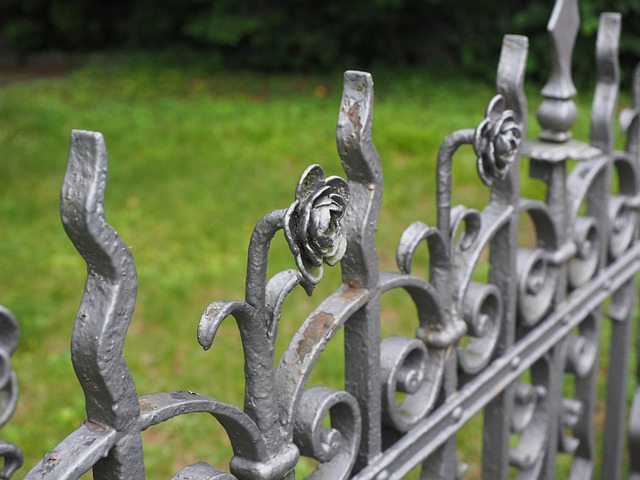In New Bedford, Massachusetts, where the climate varies significantly across seasons, proper fence maintenance is crucial to ensure longevity and aesthetic appeal. This comprehensive guide navigates the seasonal care requirements for your property’s fencing, from understanding the local climate’s impact to practical cleaning, inspection, repair, and treatment tips. By following these recommendations, you’ll safeguard your investment against common issues and elements, ensuring your fence remains in top condition year-round.
- Understanding New Bedford's Climate for Fencing
- Seasonal Cleaning and Inspection Tips
- Repairs and Maintenance Schedule
- Treating Common Fence Issues in Each Season
- Protecting Your Fence from Local Elements
- Storage and Preparation for Year-Round Durability
Understanding New Bedford's Climate for Fencing
New Bedford, Massachusetts experiences distinct seasons, with cold winters and warm summers. This climate poses unique challenges for fence maintenance. During winter, extreme temperatures and frequent snowfall can weaken fence structures, especially wooden fences that are susceptible to rot and damage. In contrast, hot summer days bring high humidity levels, which can accelerate the aging process of fencing materials. Understanding these seasonal fluctuations is crucial for homeowners in New Bedford to implement effective maintenance strategies.
For instance, winterizing a fence before freezing temperatures set in involves cleaning and inspecting it for any signs of damage or deterioration. Applying weatherproof sealants and protective coatings on wooden fences can provide insulation against cold and moisture, prolonging their lifespan. During summer, regular cleaning and inspections are still vital to prevent the buildup of algae, moss, or other debris that could compromise the fence’s integrity.
Seasonal Cleaning and Inspection Tips
Keeping your fence clean and well-maintained is essential for its longevity, especially in New Bedford’s varying climates. As seasons change, so do the care requirements. During spring, a thorough cleaning is ideal; remove any debris, leaves, or winter deposits to prevent rot and ensure proper paint adherence. Use a pressure washer or a soft brush to gently scrub the fence, then rinse with clean water. This process prepares your fence for new coats of paint or sealant if needed.
Regular inspections are also vital. Check for loose or damaged boards, rusted hardware, and signs of pest activity like termite damage. Address any issues promptly to avoid further complications. In autumn, before the first frost, inspect again to ensure everything is secure. Pruning nearby trees and shrubs will also help maintain your fence’s aesthetics and structural integrity by preventing overgrowth that could cause damage.
Repairs and Maintenance Schedule
Regular fence maintenance is key to ensuring your New Bedford, Massachusetts property stays in top condition throughout all seasons. A well-maintained fence not only enhances the curb appeal of your home but also provides security and privacy. To keep your fence in optimal shape, establish a repairs and maintenance schedule tailored to the local climate and the type of fencing material you have.
During the spring, inspect your fence for any winter damage, such as broken or missing boards, loose posts, or rusted hardware. Address these issues promptly using suitable repair techniques and materials. Summer is an ideal time for deep cleaning, painting, or staining your fence to protect it from UV rays and potential rot. In the fall, consider sealing your fence to safeguard against the upcoming winter months. Lastly, in winter, take this opportunity to trim any overgrown vegetation that may be damaging your fence over time.
Treating Common Fence Issues in Each Season
In New Bedford, Massachusetts, fences face distinct challenges throughout the year, requiring proactive maintenance to ensure longevity. Spring brings a burst of new growth, making it crucial to inspect fences for any winter damage and treat any signs of rot or decay promptly. During the summer months, regular cleaning and sealing can protect against fading and UV damage. Autumn’s beauty can hide fence issues; a thorough check is essential before winter sets in, addressing problems like loose pickets or damaged posts to prevent further deterioration.
Winter’s harsh conditions demand extra care. Treating fences with water-repellent coatings or preservatives can shield them from freezing temperatures and snow accumulation. Keeping an eye on these seasonal changes allows property owners to maintain their fences effectively, ensuring they remain strong and secure throughout the year.
Protecting Your Fence from Local Elements
In New Bedford, Massachusetts, your fence faces unique challenges due to the region’s local elements. The area’s salty sea air and unpredictable weather can take a toll on even the sturdiest of fences. To protect your investment, regular cleaning is essential. Start by removing any debris, leaves, or moss that have accumulated over the winter months. Use a soft-bristled brush to gently scrub the fence, avoiding harsh chemicals that could damage the material.
After cleaning, apply a fresh coat of paint or sealant designed for outdoor use. This protective layer will create a barrier against moisture and UV rays, prolonging the life of your fence. Consider power washing for a thorough clean but be mindful of high-pressure settings that could potentially damage the fence structure. Regular maintenance and these simple steps will ensure your New Bedford fence remains sturdy and attractive through all four seasons.
Storage and Preparation for Year-Round Durability
To ensure your fence maintains year-round durability in New Bedford, Massachusetts, proper storage and preparation are essential steps. During the fall, after cleaning and inspecting your fence, disassemble any removable parts like gates or panels for easier storage. Clean and dry these components before placing them in a protected area, such as a garage or shed. Use breathable covers to safeguard against weather damage and rust.
For wooden fences, consider applying a fresh coat of sealant or paint before storing. This final protective layer helps prevent rot, mold, and insect infestation during the off-season. Metal fences should be checked for loose connections and any signs of corrosion, addressing these issues before storage to maintain structural integrity over time.
